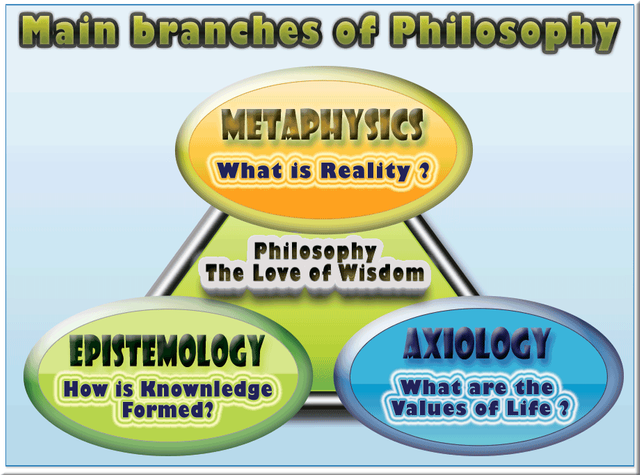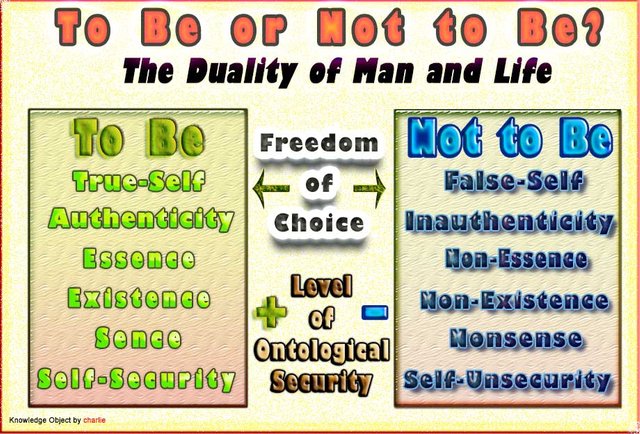What is Existentialism? - Part 1 - Unplugged and Erratic Introduction to Existentialism
The Dialectics of Liberation: Anarchism, Existentialism, and Decentralism.
What is Existentialism? - Part 1 - Unplugged and Erratic Introduction to Existentialism
"There is no freedom outside in society, just inner freedom" - charlie777pt
1- Preamble
Existentialism was born from modern man's need to possess a set of values as a new system of beliefs he could rely on, for the purpose of adaptation to the complexity of contemporary society where rationalism had no place anymore.
This era of information warfare where true and false are getting impossible to distinguish, is alienating humanity's spirit with psychological ambiguity to block individual will and suffocate social change, so it's time to get more focused in our sense of freedom and choice of life as the drivers of our psychological security.
"The growing consciousness is a danger and a disease." - Friedrich Nietzsche
Existentialism is an anthropological and philosophical reflection on the nature and existence of man and is the answer to the ethical question of human condition, condemned to take inner responsibility for their choices and the results of their actions.
"Man is born free and responsible for the choices for his Existence, that modify and prevail over his Essence" - charlie777pt
An existentialist is a person who values independence of spirit and freedom of movement above anything else in life and is against restrictions imposed to his/her own convictions, showing some common beliefs to any anarchist or decentralist.
The path to the inner self, seems to be the only way to change systems and overcome oppression or repression and improve the human condition.
Before we enter into the subject of Existentialism we will shape the philosophical context where existentialism emerged under the label of Continental Philosophies that we will analyze on my next post, let us here quickly recall what are the main branches of Philosophy:
- Metaphysics (What is Reality?)
- Epistemology (How is Knowledge formed?)
- Axiology (What are the Values for Llife?)
2 - The Alienated Man
Existentialism is a philosophy of the individual freedom to choose and try to rationalize and establish a meaning in life to fulfill our existence in an absurd and irrational world.
Existence is an absurdity that can't be rationalized, and human life is anxiety, loneliness, and guilt, making anguish generated from our choices as a basic fact of living, including the fight to get rid of transcendental philosophies that deny the right of human choice.
"Alien to myself, I know it. Outside of nature, against nature, without excuse, without recourse to save myself. But I shall not return under your law; I’m condemned to have no other law but my own. Nor shall I return to nature, where a thousand paths are marked out, all leading up to you. I can only follow my own path. For I’m a man…and each man must find his own way" - Jean-Paul Sartre’s play The Flies
Herbert Marcuse in his book "One-Dimensional Man: Studies in the Ideology of Advanced Industrial Society" criticizes capitalism and socialism, both trying to augment consumerism, social repression and eliminate the activist and individualist spirit in modern society, resulting in today's social crisis that he had predicted.
Herman Hesse stressed the personal search for the authenticity in Being by self-knowledge, and existentialism looks for the inner values as well as the sense and meaning of life, as an ambivalent nature of mind, creating the Absurd of its unattainability for Man, but that we should embrace the perpetual exploration and defiance of this human condition of Existence.
3 - Responsibility as an ethical principle
"If I do not reveal my views on justice in words, I do so by my conduct" - Socrates to Xenophon
Existentialism is a philosophy about the self and the sense of life, to exercise free will and freedom choice with the counterpart of personal responsibility, and it is centered in the analysis of humans goals in the living path through this world by our autonomous self-organization.
Our Existence is action to change our Essence (nature) till the end of life, and personal choices are unique works of art as a subjective form of truth, as a struggle with our inner nature.
The existentialist believes that we are all born free but condemned to the anxiety of permanent conscious choice, mirrored by the inherent responsibility, without the constraints of religions, laws, rules, or traditions, that are considered arbitrary regulations.
The sense of anxiety is augmented by an unfocused attention on the self-human condition or the awareness of the world around us, that is always underlying the process of personal choices.
These concepts sound very similar to the main philosophies of the anarchists where the individual path in society is fighting for freedom and life, against the social values and centralized structure of control by the society or the state.
4 - Truth is Freedom
"The only Truth is the fight for Freedom" - charlie777pt
The German philosopher Martin Heidegger (1889-1976) was an explorer of the nature of Being and of Existence and had always refused paternity or involvement in the existentialist movement.
For Kierkegaard, Man is entirely free to choose, apart from the logical predetermination which for Hegel would determine facts and also human behavior, and that truth will always be subjective because the struggle for freedom will always be unlimited.
There is no meaning, project of life, or an essence for man, which constructs itself as a truth for itself so that "existence precedes essence", or as Jean Piaget said in his genetic structuralism, also at the level cognitive "action precedes thought".
Truth is not a product of logic but an emotion, a passion for affirming action to uphold the facts.
"Life is short and even though truth appears remote, the truth lives long: so tell the truth!" - Arthur Schopenhauer
Before you can dive into existentialist philosophy, we must feel the sense of abandonment by the illumination that there is no transcendent and omnipotent entities or gods that build our fate.
We are born free, to feel the anxiety of permanent choice and its consequences because we are the only architects shaping our destinies through our actions, thoughts and experience.
Existentialism is focused on the purpose and meaning of life and existence with Realism writers like Albert Camus, Franz Kafka, T.S. Eliot, Boris Vian, with his exponent in the works of the great master of literature Fyodor Dostoevski, transposing to writing the real-life events and characters
Sartre it is focused on the morality of the actions in which man is totally responsible for what he is in his existence to transform his essence.
" Man is not only as he conceives himself, but as he wishes it to be, as he desires the impulse to existence; that is to say, man is nothing else what he does, it is no more than his act. Man is nothing more than his design; exists only in so far as it takes place; is nothing but the set of his acts."- Jean-Paul Sartre
Existentialism revealed itself in several authors with different faces, from Kierkegaard who was a religious moralist to Heiddeger a phenomenologist who later became Nazi, Nietzsche, a relativistic anti-Christian agnostic, and Sartre or Camus characterized by amorality and atheism.
For Sartre, Authenticity comes from Freedom of Choice that builds our Values and shapes our project for life (based in Heidegger's grounding concept) with our desire for Being (of freedom and relation to objects) and Having (possessions as a symbol of one's self).
Heidegger saw the essence of technology as a framework for the mode of Being, and the concept of Dasein (Existence), that we make from what we are made of, with the infinite potentiality possibility of our imagination to shape the Future, always conditioned by the Past.
Kierkegaard sees the essential stages of life as a dialectic between Aesthetics (transform boredom into an interesting perspective), Ethics ( separate good/evil from outside rules) and Religion (paradox of relation with God(s))
"Existence with other human beings can be both Being as the true-self, and not-Being as a false-self" - charlie777pt
5 - To Be or Not To Be?
On the other hand, Kierkegaard emphasized the concept of the inevitability of Death, that reveals the authentic self and that Existence can't experience it, but only as a way to deal with it with our attitude or Being with an authentic mode of acceptance or a refusal leading to Non-Being.
The Future is our own irreversible choice, and authenticity of Existence shapes our Essence (to Be) and in my point of view, inauthenticity became shadows of our Non-Being as a self-denial to Exist, as life not lived.
And to end this erratic thought I post here is a half-psychotic figure to reflect on the old question of Being or Not-Being in our choices for our actions, which trace the destiny of our life and our Essence.
On purpose, in order to avoid further distress to the reader (lol), I avoided here the figure of "having or not having" which is also a factor in the complexity of the choices and decisions in our lives that I mentioned above, the Sartrean concept of our desire To Be (of freedom and relation to objects) and To Have (possessions as a symbol of oneself).
And in the next post we will return to a more ordered thought to reflect on the various philosophies that influenced existentialism (s), its history, its authors, including a majority that has always refuted the label of existentialist.
Then we will talk about Humanism and its links to Existentialism, its relations with individualism, anarchism and the philosophy of decentralism
Short Video:
Existentialism: Crash Course Philosophy #16
The Dialectics of Liberation: Anarchism, Existentialism and Decentralism.
Published Posts:
Introduction to the Dialectics of Liberation: Anarchism, Existentialism and Decentralism
I - Anarchism
- What is Anarchism?
- The History of Anarchism
- Part 1 - Pre-Anarchy - Social Revolution
- Anarchy: Revolution Against The State
- Anarchy Today
- Index and Conclusions of part 1 - Anarchy
II - Existentialism
- What is Existentialism ?
- Part 1 - Unplugged Introduction to Existentialism - This post
Next posts on the Series:
II - Existentialism(Cont.)
- What is Existentialism ? (Cont.)
- Part 2 - The Short History of Existentialism
- Part 3 - The Philosophy of Existentialism
- Part 4 - The Fear of Freedom of Erich Fromm
- The "Existentialists"
- Part 1 - The Players
- Part 2 - Jean Paul Sartre - the Man of The 20th Century
- Humanism and Existentialism
- Existentialism and Anarchism
- The Future : Posthumanism, transhumanism and inhumanism
III - Decentralism
- What is Decentralism?
- The Philosophy of decentralism
- Blockchain and Decentralization
- Anarchism, Existentialism, and Decentralism
IV - Dialectic for Self-Liberation
- The Dialectics of Liberation Congress
- Psychedelics, Libertarian and artistical movements
- Psychoanalysis and Existentialism
- The Anti-psychiatry movement


Existentialism is well explained in albert Camus ' book the Myth of Sisyphus, in which he describes the main character Sisyphus, who wears stones on the hill every day, thus emphasizing the meaninglessness, but we see that we can accept and enjoy existence in spite of the monotonous reality,look around and see something new for ourselves – even in this cyclicity.
Hi Sergey, thanks a lot for your great comment.
This book really influenced my life and help me to solve a lot of inner internal anguish.
Maybe we need to understand that life is meaninglessness, before starting to find some direction in our lives, to overcome this absurdity that helps to stick to moral integrity, with human and social solidarity.
Hey friend... Waiting for your blog..